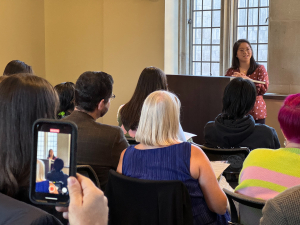Shaun King, Trinity Communications

“Let me first begin by saying that I was a graduate student when Ole Holsti was a professor here,” Edmund Malesky. said from the lectern where he was awarding the Ole R. Holsti Prize in Political Science and Public Policy from the Duke University Libraries. “He was one of the most creative and thoughtful people I knew in terms of his understanding of the global political economy. I think that he would also be really excited to have seen Axelle’s paper.”
Axelle Miel, a graduating senior, received this year’s Holsti Prize at the annual awards event. She was seated in the audience, recording a cellphone video clip of Malesky, her professor.
When it was Miel’s turn to speak, Malesky would record a clip of her.

The paper Miel submitted for the competition grew out of her research in Malesky’s course on political economy.
“It’s a class where we study how firms operate in the international environment,” Malesky said. “So first, we learned about how businesses choose locations to invest in, we learn about how they manage their global supply chains, the partnerships, and then we look at how political risk changes their calculation.
“And then at the end, I give the students a chance to do a case study of their own.”
Miel said she had never written a research paper in the form of a business case study, but she enjoyed the challenge. She found a story of tension between the government and the largest private employer in the Philippines. “It’s a real shock,” she said.

In an attempt to speed up economic recovery after COVID, the Philippine government offered tax incentives to corporations that repealed remote work. They were designed to be too good to pass up, but the country’s largest private employer, which is based in the United States, rejected the offer.
“In my paper,” Miel said, “I analyzed what that meant for the future of foreign investments and the economic environment in the Philippines.”
“What makes Axelle’s case very special is that she brings to it primary research,” Malesky said, including archival documents, the company’s business plan, and interviews.
“I had to create a narrative,” Miel said, “from the employer side, the employee side, the government side, and then even navigate the politics of the election.
"I'm just really grateful to the Duke Libraries for recognizing my paper, and to my advisor, Professor Eddy Malesky, for all his support not just for this paper, but for all my scholarly endeavors.”